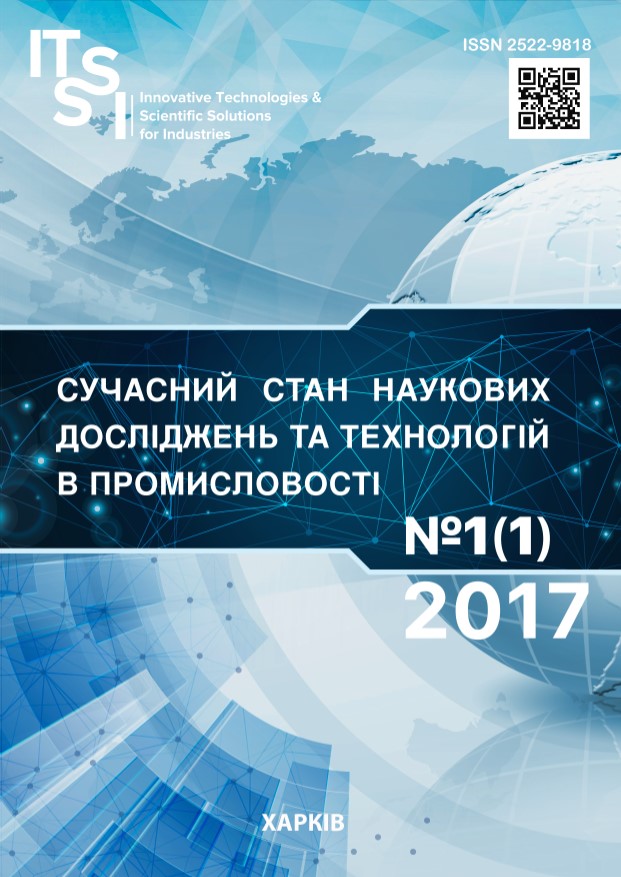REGULATORY ENVIRONMENT OF BUSINESS ACTIVITIES IN UKRAINE
DOI:
https://doi.org/10.30837/2522-9818.2017.1.124Keywords:
enterprise, regulation, permitting system, legal system, licensing, taxation system, inspection system, technical regulationAbstract
The subject of this study is the tools used by the state that create the regulatory environment for business activities in Ukraine. The goal of the article is to analyse the regulatory environment of Ukrainian enterprises, to reveal the conditions in which they operate on the basis of the study of legal regulations and requirements as well as on international ratings based on social surveys of Ukrainian society. Objectives: to review the regulatory environment, to study the status of the permitting system, the control system (inspections), technical regulation, the tax system and legislative acts. General scientific methods used are: methods of empirical research (observation, comparison, visual-graphic methods), method of system analysis, induction, deduction, specification. The following results are obtained. Regulation can be defined as the policy of influence based on understanding the nature of the object to which the regulation is directed, and on the well-defined perspective of the image of this object, which is planned to be achieved with the help of certain regulators. The main such regulator of activity of business entities is the state. Considering Ukraine's place in the rating study of the International Finance Corporation of the World Bank "Doing Business – 2017", the main conditions of business practices of Ukrainian enterprises and the state's influence on business environment have been researched. Although Ukraine's place in the rating has risen one point (the 80th place) compared to the previous year, according to certain parameters our state significantly lags behind both leading and neighbouring countries. This includes, in particular, obtaining building permition, difficulties in closing down of business and global commerce. Ukraine even did not find itself in top hundred according to these parameters. However, in such areas as permitting system, inspection system, technical regulation there are significant changes aimed at simplifying basic procedures and reducing regulatory pressure. Conclusions. Despite these innovations, there still exists bureaucracy, frequent changes in legal regulations and requirements and their imperfections in general. As a result, corruption and shadow economy still affect Ukrainian enterprises. The reduction of overregulation of domestic enterprises activities should become one of the main measures for creating optimal conditions for business in Ukraine.References
"State Audit Office of Ukraine", available at: http://195.78.68.73/kru/uk/index
Brodsky, G. М., Yatsishina, M. Yu., Andreev, O. V., Struk, V. M., Tripolsky, O. V., Lepiska, O. V., Palazov, O. V. (2012), State policy on licensing system in the sphere of economic activity: Directory (updated), Kyiv, 258 p.
"The State Fiscal Service of Ukraine", available at: http://sfs.gov.ua/ Didivska, L. I., Golovko, L. S. (2006), State regulation of the economy: Teaching. manual - 5th kind., Ster, Kyiv, Knowledge, 213 p.
Zhdanov, I. "Corruption in Ukraine: an attempt to analyze", available at: http://acy.org.ua/igor-zhdanov-koruptsiya-v-ukrajini-sproba-analysis/
"National Commission on Securities and Stock Market of Ukraine", available at: http://www.nssmc.gov.ua/
"About Amendments to the Law of Ukraine "About the Basic Principles of State Supervision (Control) in the Field of Economic Activity Regarding the Liberalization of the System of State Supervision (Control) in the Field of Economic Activity”: Law of Ukraine of November 3, 2016 No. 1726-VIII", available at: http://zakon2.rada.gov.ua/laws/show/1726-19
"About the Principles of State Regulatory Policy in the Field of Economic Activity: Law of Ukraine of 11.09.2003 №1160-IV", available at: http://zakon2.rada.gov.ua/laws/show/1160-15
"About the List of Permits Permits in the Sphere of Economic Activity: Law of Ukraine of 19.05.2011 №3392-VI", available at: http://zakon3.rada.gov.ua/laws/show/3392-17
"About licensing of types of economic activity: Law of Ukraine dated 02.03.2015 №222-VIІІ", available at: http://zakon3.rada.gov.ua/laws/show/222-19
"On Technical Regulations and Conformity Assessment: Law of Ukraine dated January 15, 2015 №124-VIІІ", available at: http://zakon2.rada.gov.ua/laws/show/124-19
"About Temporary Peculiarities of Implementation of State Supervision (Control) Measures in the Field of Economic Activity: Law of Ukraine dated 02.03.2015 №1728-VIІІ", available at: http://zakon2.rada.gov.ua/laws/show/1728-19
"Doing Business 2017 Reforming Through Difficult Times", available at: http://www.doingbusiness.org/data/exploreeconomies/ukraine/ Transparency International (2016), The 2016 Global Corruption Barometer Report, Berlin, Transparency International, 40 p.
Downloads
How to Cite
Issue
Section
License
Copyright (c) 2018 Natalia Chekh, Ivan Vinnyk

This work is licensed under a Creative Commons Attribution-NonCommercial-ShareAlike 4.0 International License.
Our journal abides by the Creative Commons copyright rights and permissions for open access journals.
Authors who publish with this journal agree to the following terms:
Authors hold the copyright without restrictions and grant the journal right of first publication with the work simultaneously licensed under a Creative Commons Attribution-NonCommercial-ShareAlike 4.0 International License (CC BY-NC-SA 4.0) that allows others to share the work with an acknowledgment of the work's authorship and initial publication in this journal.
Authors are able to enter into separate, additional contractual arrangements for the non-commercial and non-exclusive distribution of the journal's published version of the work (e.g., post it to an institutional repository or publish it in a book), with an acknowledgment of its initial publication in this journal.
Authors are permitted and encouraged to post their published work online (e.g., in institutional repositories or on their website) as it can lead to productive exchanges, as well as earlier and greater citation of published work.














